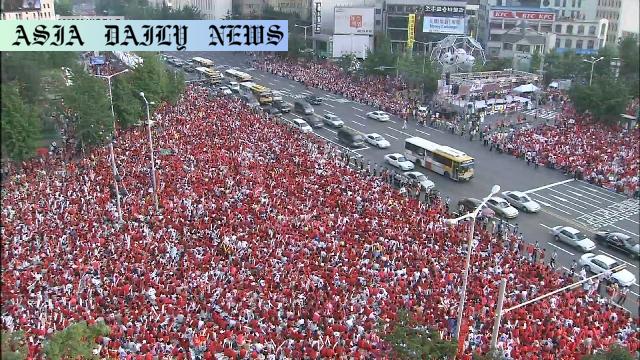Co-hosting: Newly declassified documents in South Korea reveal Japan’s 1994 proposal for a joint World Cup with South Korea.

Introduction to the Historical 2002 World Cup Co-Hosting Proposal
The 2002 FIFA World Cup marked a historical milestone as it was the first tournament to be co-hosted by two nations—Japan and South Korea. Newly unveiled diplomatic documents revealed a major turning point: Japan’s initial unofficial proposal to co-host the event with South Korea in 1994. These records, declassified by South Korea’s Foreign Ministry, provided intriguing insights into the geopolitics, cultural tensions, and international collaboration of the time.
The records shed light on a pivotal dinner meeting in October 1994 in Tokyo between Japan’s Foreign Minister Kono Yohei and his South Korean counterpart, Han Sung-joo. Both nations were individually vying to host the 2002 World Cup, but Kono’s suggestion of co-hosting opened the door to unprecedented sporting diplomacy. This offer proved to be not only a practical solution to the intense competition but also a symbolic gesture towards fostering cooperation between two neighboring countries with a complex historical relationship.
Diplomatic Discussions: The Evolution of the Co-Hosting Idea
During the October 1994 meeting, Kono Yohei reportedly acknowledged South Korea’s aspirations of involving North Korea in a joint World Cup bid. However, he pragmatically noted the challenges of such an arrangement and proposed that a joint effort between Japan and South Korea could be a viable alternative. Foreign Minister Han Sung-joo, while expressing doubts about North Korea’s willingness to collaborate, showed interest in the idea of working with Japan.
The proposal reflected a rare moment of compromise and collaboration between the two East Asian nations. The discussions also reveal the influence of changing diplomatic dynamics during the 1990s, as the region grappled with historical animosities while simultaneously seeking economic growth and global recognition.
FIFA’s Decision and the Event’s Legacy
In 1996, the efforts between the two nations bore fruit as FIFA officially announced Japan and South Korea as co-hosts of the 2002 World Cup. This decision not only symbolized a major step forward in regional cooperation but also set a precedent for future co-hosting arrangements in major international sporting events. The tournament itself showcased the cultural vibrancy and hospitality of both nations, leaving a lasting legacy in the world of sports.
This revelation of diplomatic collaboration also coincided with a period of change within South Korea, where restrictions on Japanese culture were gradually easing. The records highlight a notable instance where South Korea permitted singer Kye Eun-sook, who was active in Japan, to perform Japanese songs for a limited audience in Seoul. This reflects the softening of cultural barriers, fostering a more inclusive atmosphere between the nations.
Conclusion: A Historical Landmark for Regional Cooperation
The 2002 World Cup not only provided an unforgettable experience for football fans but also underscored the power of sports as a bridge-builder between nations. These newly released documents illuminate the behind-the-scenes efforts that paved the way for the groundbreaking co-hosting arrangement. The tournament became a testament to the potential of international collaboration and a step toward breaking down the cultural and historical barriers that once divided Japan and South Korea.
Commentary
Revisiting the Significance of the 2002 World Cup Co-Hosting
The revelation of Japan’s initial proposal for co-hosting the 2002 FIFA World Cup with South Korea is a testament to the transformative power of diplomacy through sports. This move, made during a time of competitive rivalries and cultural restrictions, reflects the strategic foresight of both nations’ leaders to bridge divides for a shared goal. It reminds us that collaboration often requires bold initiatives, even in the midst of societal and historical tensions.
The proposal’s success highlights how sports can transcend beyond the boundaries of the playing field, forging new pathways for collaboration and mutual understanding. Japan and South Korea, once competing for the global spotlight, chose instead to share it, demonstrating unity on one of the world’s largest stages. This serves as a blueprint for other nations, showing that partnership is not a sign of weakness, but rather a profound declaration of cooperative strength.
Lessons for Modern Diplomacy
The insights from these declassified documents also carry lessons for modern diplomacy. They emphasize the importance of openness and adaptability in international relations. While Japan recognized the challenges of South Korea’s bid involving North Korea, it pragmatically offered an alternative solution that was mutually beneficial. This pragmatic yet forward-thinking strategy is a quality that governments worldwide could learn to emulate as they navigate modern geopolitical challenges.
Moreover, the records’ inclusion of cultural policy discussions during the 1990s reveals the deep interconnection between diplomacy and cultural exchange. As restrictions on Japanese culture in South Korea began to ease, they paved the way for a more inclusive and collaborative future—a reminder that cultural openness can be a powerful tool for bridging divides and fostering rapport between nations.
A Legacy Worth Celebrating
The 2002 World Cup will be remembered not just for its remarkable matches, but for the symbolism behind its hosting arrangement. It serves as a reminder that global challenges can often be resolved through pragmatic solutions, shared visions, and the uniting force of shared passions, such as sports. Japan and South Korea’s bold decision to move forward with a joint bid changed the narrative of rivalry into one of cooperation, leaving an inspiring legacy for generations to come.


